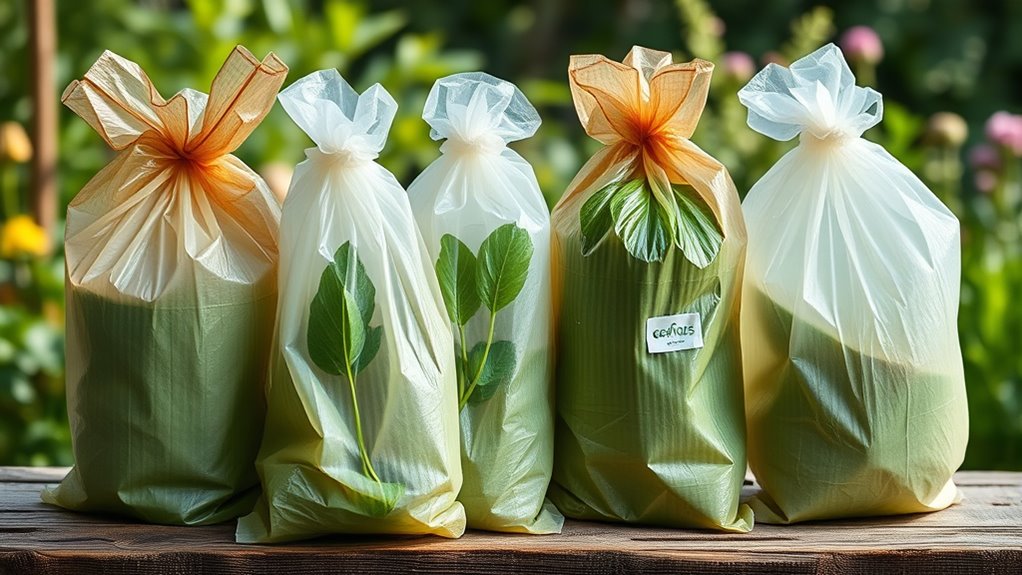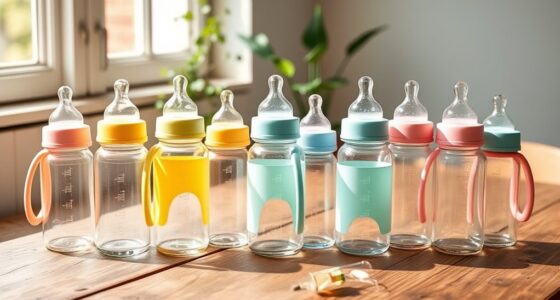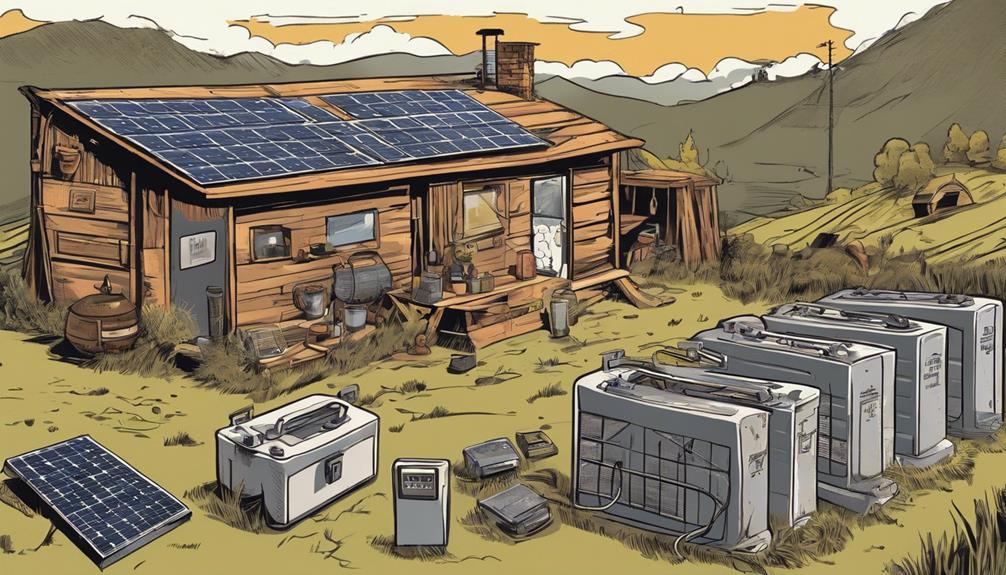If you’re looking for the best eco-friendly, strong compostable garbage bags, I’ve got you covered. These bags are made from biodegradable plant-based materials like PLA and PBAT, certified to break down within months using standards like ASTM D6400 and OK Compost. They’re tear-resistant, leak-proof, and suitable for various uses—from small kitchen bins to yard waste. Plus, many feature drawstrings or reinforced bottoms for easier handling. Keep going, and you’ll discover some top options that blend sustainability with durability.
Key Takeaways
- These bags are made from biodegradable, plant-based materials certified to meet strict standards like ASTM D6400 and EN13432.
- They come in various sizes and thicknesses, offering durable, leak-proof options suitable for different waste types.
- Many are reinforced with features like star-sealed bottoms and handles for extra strength and ease of use.
- Properly disposed of in industrial or home composting environments, they decompose into organic matter within months.
- They provide an eco-friendly alternative to traditional plastic bags without sacrificing strength or functionality.
Repurpose 3 Gallon Compostable Small Bin Trash Bags
If you’re looking for an eco-friendly solution for small trash needs, the Repurpose 3 Gallon Compostable Small Bin Trash Bags are an excellent choice. These 100 biodegradable bags are made from PLA material, are FDA approved, and are perfect for food scraps, bathroom trash, or quick cleanup. They’re sturdy, leak-proof with star-sealed bottoms, and resistant to tearing from typical waste. The green color and compostable design make them a sustainable alternative to plastic. Plus, they come in recyclable packaging and break down naturally in composting facilities, making them ideal for eco-conscious households aiming to reduce plastic waste.
Best For: eco-conscious households seeking a durable, compostable solution for small trash and food scraps in indoor settings.
Pros:
- Made from FDA-approved, non-toxic PLA material, safe for food contact.
- Leak-proof star-sealed bottom and tear-resistant design ensure durability during use.
- Environmentally friendly alternative to plastic, compostable and recyclable packaging supports sustainability.
Cons:
- Not suitable for heavy or long-term waste, especially wet or sharp items.
- Best used within a week to prevent leaks or punctures due to moisture or waste buildup.
- Limited capacity (3 gallons), may require frequent replacement for high-volume use.
13 Gallon Compostable Trash Bags, 100 Count, with Drawstring, Tear-Resistant, Food Waste Bags, ASTM D6400, BPI & Europe OK Compost Certified
These 13-gallon compostable trash bags are an excellent choice for anyone seeking durable, eco-friendly waste disposal options. Made from plant starch (corn), they’re biodegradable, tear-resistant, and designed to handle food waste and general trash. The drawstring feature makes tying and carrying easy, while the thickened material guarantees strength and leak prevention. Certified by BPI, ASTM D6400, and Europe OK Compost, they meet strict environmental standards. Packaged in two rolls of 50, these bags are convenient for kitchens, offices, or outdoor use. With positive reviews praising their durability and eco-friendliness, they’re a reliable, sustainable alternative to traditional plastic bags.
Best For: eco-conscious households, offices, and outdoor event organizers seeking durable, biodegradable waste disposal solutions.
Pros:
- Made from plant starch (corn), ensuring eco-friendliness and biodegradability.
- Thickened design provides tear resistance, leak prevention, and durability.
- Certified by BPI, ASTM D6400, and Europe OK Compost, meeting strict environmental standards.
Cons:
- May be too large or small for some specific trash containers, such as certain compost pails.
- No additional features like scented options or extra thick reinforcement.
- Being made in China, some users might prefer locally produced alternatives.
SUPERBIO 13 Gallon Compostable Kitchen Waste Bags
The SUPERBIO 13 Gallon Compostable Kitchen Waste Bags stand out for their sturdy design and eco-friendly materials, making them an excellent choice for anyone aiming to reduce plastic waste without sacrificing durability. Made from PLA+PBAT plant starch, these bags are certified biodegradable and meet strict composting standards, ensuring they break down in landfills over months. With reinforced star-sealed bottoms, handle ties, and tear-proof construction, they handle heavy trash confidently. Sized to fit standard 13-gallon cans, they’re unscented and suitable for both indoor and outdoor use. Many users praise their strength, size, and eco-credentials, making them a practical, green alternative to traditional plastic bags.
Best For: environmentally conscious homeowners and eco-friendly households seeking durable, compostable trash bags for kitchen waste.
Pros:
- Made from plant-based PLA+PBAT material that is certified biodegradable and eco-friendly
- Strong, tear-proof construction with reinforced star-sealed bottoms suitable for heavy loads
- Fits standard 13-gallon trash cans and includes handle ties for easy sealing and removal
Cons:
- May not be compatible with all local composting facilities; check www.findacomposter.com for options
- Shelf life is approximately one year, requiring timely use before expiration
- Not suitable for disposal of waste containing strong acids or alkalis, which should be disposed of within three days
Compostable Bags, 6 Gallon Food Scraps Yard Waste Bags
For those seeking an eco-friendly solution for small waste disposal, compostable 6-gallon bags offer an ideal fit. These bags, measuring 21” W x 23” H, are perfect for kitchen scraps, yard waste, or small trash cans in the bathroom, bedroom, or office. Made from plant starches and certified by BPI, ASTM D6400, and EU EN13432, they’re biodegradable and suitable for home or industrial composting. Their triple-ply design prevents leaks and tears, making them durable and reliable. Plus, the roll format allows easy tearing, and the wide opening simplifies loading into compost bins. They’re a practical, eco-conscious choice for managing small waste efficiently.
Best For: individuals and households seeking an eco-friendly, leak-resistant solution for small-scale kitchen, yard, and household waste disposal.
Pros:
- Made from biodegradable plant starches, environmentally friendly and certified for composting
- Durable triple-ply design prevents leaks and tears, ensuring reliable performance
- Fits most small trash cans and compost bins, with easy tear roll format for convenience
Cons:
- May leak if not emptied regularly, especially with moist or heavy waste
- Smaller size (6 gallons) may be inadequate for larger or heavily soiled kitchen trash
- Larger bags on the roll may weaken over time or puncture with tough or sharp waste
UNNI Compostable Liner Bags, 13 Gallon, 50 Count
If you’re looking for a reliable compostable garbage bag for your kitchen, UNNI’s 13-gallon liners stand out as an excellent choice, especially for those who want eco-friendly options without sacrificing durability. These bags are designed for tall kitchen bins, measuring 23.75 x 31.49 inches with a sturdy 0.9 mil thickness, making them suitable for food scraps and wet waste. Certified for industrial and home composting, they meet ASTM D6400 standards and carry TÜV Austria’s OK compost HOME certification. Sold in packs of 50, they balance strength with eco-consciousness, helping you reduce plastic waste while managing your kitchen waste efficiently.
Best For: environmentally conscious households seeking durable, eco-friendly compostable bags for their kitchen waste.
Pros:
- Certified for both industrial and home composting, ensuring eco-friendliness.
- Thicker (0.9 mil) design reduces tearing and leaks compared to other biodegradable options.
- Sized appropriately for small to medium kitchen compost bins, fitting standard tall bins comfortably.
Cons:
- Slightly prone to small holes and tearing, especially under heavy loads or when dealing with liquids.
- Can fall into trash cans or break if overloaded, requiring double-bagging or additional support.
- Some users find the bags slightly short for larger or taller compost bins, limiting versatility.
AYOTEE Compostable Trash Bags, 13-15 Gallon, 60 Count
Looking for a reliable, eco-friendly trash bag that fits standard household and office bins? The AYOTEE Compostable Trash Bags are a great choice. Made from Plastarch Material (PSM) derived from natural plant starch, they’re certified under ASTM D6866. These bags are designed for 13-15 gallon cans, measuring 23.6 x 31.5 inches with a sturdy 1.18 mil thickness for strength and slip resistance. They come in a pack of 60 bags, divided into four rolls, making them perfect for everyday use—whether for kitchen waste, paper, or even cat litter. Best of all, they’re odorless and promote sustainable living, reducing environmental impact.
Best For: households and offices seeking eco-friendly, durable trash bags compatible with standard 13-15 gallon cans.
Pros:
- Made from certified biodegradable Plastarch Material, reducing environmental impact.
- Strong and slip-resistant with a 1.18 mil thickness, capable of handling various waste types.
- Odorless and safe for household use, promoting a cleaner, greener lifestyle.
Cons:
- Not suitable for backyard composting due to industrial-only degradability.
- Slightly larger or smaller cans may require adjustments in bag sizing or fit.
- Limited color options, as they are natural and transparent, which might not suit all aesthetic preferences.
13 Gallon Compostable Trash Bags (30 Bags, ASTM D6400 Certified)
These 13-gallon compostable trash bags stand out as an excellent choice for eco-conscious households and small offices seeking durable, plant-based waste solutions. Made from biodegradable PLA and PBAT, each bag is designed to break down into organic matter, enriching the soil while reducing plastic waste. Certified by BPI and TÜV Austria, they meet ASTM D6400 standards, ensuring eco-friendly disposal. With a sturdy 1-mil thickness, they resist leaks and punctures, handling kitchen scraps and household trash with ease. Each pack contains 30 tall, leak-resistant bags with functional drawstrings, making waste management simple and environmentally responsible.
Best For: eco-conscious households, small offices, and anyone seeking durable, plant-based waste disposal solutions that reduce plastic pollution.
Pros:
- Made from biodegradable, plant-based materials (PLA and PBAT) that break down into organic matter, supporting sustainable waste management.
- Thick 1-mil design resists leaks and punctures, suitable for kitchen scraps, household, and garden waste.
- Certified by BPI, TÜV Austria, and meets ASTM D6400 standards, ensuring reliable eco-friendly disposal.
Cons:
- Some users experience drawstrings pulling out or bags tearing when overfilled or stretched.
- Occasional sizing or fit issues with certain trash cans reported by customers.
- Price may be higher compared to traditional plastic trash bags, which could be a consideration for budget-conscious buyers.
SUPERBIO 13 Gallon Compostable Kitchen Waste Bags
The SUPERBIO 13-gallon compostable kitchen waste bags stand out as an ideal choice for eco-conscious households seeking a sturdy, large-capacity option. Made from plant-based PLA+PBAT material, these bags are certified biodegradable and meet strict ASTM D6400 and EN 13432 standards. They’re tear-proof, unscented, and feature handle ties for easy sealing. Designed to fit standard 13-gallon trash cans, they’re perfect for indoor or outdoor use. With reinforced star-sealed bottoms, they can handle heavy loads without tearing. Rated 4.7 stars, users love their strength, size, and eco-friendliness. They’re a practical, sustainable alternative to traditional plastic trash bags.
Best For: environmentally conscious households seeking durable, large-capacity compostable bags for indoor and outdoor food waste disposal.
Pros:
- Made from plant-based materials meeting rigorous composting standards, eco-friendly and biodegradable.
- Sturdy, tear-proof design with reinforced star-sealed bottoms for heavy loads.
- Includes handle ties for secure sealing and easy removal, enhancing convenience.
Cons:
- May require access to specialized composting facilities not available in all areas.
- Limited shelf life of approximately one year if not stored properly.
- Larger size may not be suitable for smaller trash cans or specific household needs.
UNNI Compostable T-Shirt Bags with Handle-Tie, 2.6 Gallon
For anyone seeking a reliable compostable bag that combines durability with eco-friendliness, the UNNI Compostable T-Shirt Bags with Handle-Tie stand out as an excellent choice. With a 2.6-gallon capacity and sturdy 0.68 mil thickness, these bags handle food scraps and organic waste effortlessly. Their handle-tie feature makes tying and carrying simple, while the green color and unscented design add convenience. Certified for industrial composting under ASTM D6400 standards, they biodegrade within six months, reducing landfill impact. Perfect for small kitchens or compost bins, they offer a practical, eco-friendly solution supported by positive reviews praising their strength and usability.
Best For: environmentally conscious households and small-scale composters seeking durable, eco-friendly trash bags for organic waste.
Pros:
- Certified biodegradable and compliant with ASTM D6400 standards, ensuring eco-friendly disposal.
- Sturdy 0.68 mil thickness with handles for easy tying and carrying.
- Compact size and capacity ideal for small kitchens or compost bins, with positive user reviews praising durability and convenience.
Cons:
- Occasional reports of handle tearing or leaks at the bottom, especially with hot or reused contents.
- Limited to 2.6-gallon capacity, which may not suit larger waste needs.
- Requires proper disposal at commercial composting facilities, which may not be available locally in all areas.
Emilys Choice Biodegradable Trash Bags, 50 Count
If you’re looking for heavy-duty biodegradable trash bags that can handle heavy, wet waste without tearing, Emily’s Choice Biodegradable Trash Bags are an excellent option. Made from high-density polyethylene with 1.2 mil thickness, these bags are puncture-resistant and durable enough to withstand sharp objects. Designed to fit 13-17 gallon cans, they feature strong drawstrings for secure tying. Certified under ASTM 6954 standards and using D2W technology, they break down quickly into eco-friendly materials. Rated 4.6 stars from over 1,200 reviews, users praise their strength and reliability, making them a practical and environmentally conscious choice for everyday waste.
Best For: households and businesses seeking durable, eco-friendly trash bags that can handle heavy, wet waste without tearing.
Pros:
- Highly durable and puncture-resistant, capable of holding sharp objects and heavy loads
- Made with biodegradable D2W technology, ensuring rapid environmental breakdown
- Strong drawstrings for secure tying and easy removal from trash cans
Cons:
- Higher price point compared to conventional plastic trash bags, which may be a concern for cost-conscious consumers
- Occasional reports of tear or drawstring breakage during use
- Recent price increases have led to perceptions of price gouging, impacting perceived value
AmazonCommercial 18G Compactor Bags – 18 Gallon – 50 Count – 2 Mil
AmazonCommercial’s 18G Compactor Bags stand out as an excellent choice for commercial users and households with built-in trash compactors. These 18-gallon bags are made of durable, opaque plastic, designed specifically to fit standard compactors around 16 x 9.25 x 17.25 inches. With a sturdy 2-mil thickness, they resist tearing and hold heavy waste securely, featuring a convenient drawstring closure for easy sealing. Despite some minor fit issues, most users find them reliable and long-lasting, often using a single bag for up to two weeks. Overall, they’re a cost-effective, robust solution for heavy-duty waste management.
Best For: users with built-in kitchen trash compactors seeking durable, heavy-duty bags that fit standard 18-gallon compactor sizes.
Pros:
- Made of thick, durable plastic that resists tearing and leaks
- Features a drawstring closure for secure sealing and easy disposal
- Cost-effective alternative to original or thinner trash bags, with long-lasting use
Cons:
- Slightly loose fit in some compactors, requiring additional securing methods
- Perforated top seal can be difficult to peel cleanly initially
- May not always fill to full 18-gallon capacity, with some sizing inconsistencies
Healthy Earth 13 Gallon Compostable Trash Bags
Healthy Earth’s 13 Gallon Compostable Trash Bags stand out as an excellent choice for eco-conscious households and businesses seeking durable, plant-based waste solutions. Made from biopolymer and certified by BPI and TÜV Austria, these heavy-duty bags are 30 microns thick, ensuring strength, leak resistance, and tear durability. Designed to fit standard 13-gallon bins, they feature reinforced drawstrings for secure tying. Lightweight, soft, and slightly stretchy, they handle food scraps, wet waste, and household trash. Although ideal for commercial composting, many users appreciate their eco-friendly materials and company commitment—donating 10% of profits to cleanup initiatives—making them a responsible waste management option.
Best For: environmentally conscious households and businesses seeking durable, plant-based compostable trash bags for commercial or curbside waste disposal.
Pros:
- Made from plant-based biopolymer, certified for compostability by BPI and TÜV Austria, ensuring eco-friendly disposal.
- Thick, heavy-duty 30-micron design provides durability, leak resistance, and tear strength suitable for various waste types.
- Reinforced drawstring handles offer secure tying and easy disposal, fitting standard 13-gallon bins.
Cons:
- Intended primarily for commercial composting facilities; may not decompose effectively in regular landfills or home compost systems.
- Can be inconvenient to tear apart from a roll, requiring manual handling instead of pre-separated bags.
- Higher price point (~$24.69 for 30 bags) makes them more suitable for larger-scale use rather than everyday household disposal.
ANECO Compostable Waste Bags for Kitchen (100 Count)
For those seeking an eco-friendly solution for their kitchen waste, ANECO’s Compostable Waste Bags stand out as a top choice. Made from corn starch and plant-based materials, these 100% compostable bags fully decompose into CO2, water, and organic biomass within 6-12 months, meeting ASTM D6400 standards. Sized at 16.5 x 16.3 inches, they fit most 2.6-gallon containers and are sturdy enough to handle everyday waste without leaks. Certified by OK Compost Home, BPI, and Seedling Logo, they’re safe for home and industrial composting. Customers love their durability and eco benefits, making them a reliable, waste-reducing option.
Best For: individuals and households seeking an eco-friendly, durable, and certified compostable waste bag solution for kitchen and small composting needs.
Pros:
- Fully compostable and eco-friendly, meeting ASTM D6400 standards and certified by OK Compost Home, BPI, and Seedling Logo.
- Strong, leak-proof, and extra-thick design suitable for everyday waste management.
- Fits most 2.6-gallon containers and is easy to handle with a flat top for convenient disposal.
Cons:
- Some users report the bags can break down too quickly, sometimes before full use.
- Occasional fitment issues, with bags being slightly short for certain bins.
- Variability in quality across shipments, with initial batches sometimes more durable than later ones.
Compost Bags, Compostable Trash Bags 2.6 Gallon (100 Count)
If you’re looking for a reliable, eco-friendly option for small-scale composting, these 2.6-gallon compostable trash bags are an excellent choice. They measure 16.3 x 16.5 inches and are made from plant-based bioplastics, ensuring they’re biodegradable and safe for backyard composting. With a heavy-duty 0.71 mil thickness, they resist tearing and leaks, even with moist waste. Customers praise their durability, ability to hold liquids, and convenient roll design. Certified by BPI and TÜV AUSTRIA, these bags meet strict compostability standards. They’re perfect for food scraps, yard waste, and other biodegradable materials, making composting easier and more sustainable.
Best For: individuals or households seeking a durable, eco-friendly solution for small-scale composting of food and biodegradable waste.
Pros:
- Highly durable and resistant to tearing even with moist or sharp waste
- Biodegradable and certified to meet strict compostability standards (BPI and TÜV AUSTRIA)
- Convenient roll design allows for easy dispensing and storage
Cons:
- Slightly thinner bags may tear if mishandled or used with excessively moist or sharp waste
- Not suitable for long-term storage or heavy-duty trash beyond composting needs
- Some users prefer individually folded bags over the roll for easier handling
13 Gallon Compostable Trash Bags, 100 Count with Drawstring
The 13-gallon compostable trash bags with drawstrings are an excellent choice for anyone seeking durable, eco-friendly waste bags that fit standard kitchen and office bins. Measuring 23 inches by 31 inches, they come in a pack of 100, divided into two rolls with 50 bags each. Made from plant starch (corn), these bags are biodegradable, tear-resistant, and leak-proof. Certified by BPI, OK COMPOST, and TUV Seedling, they guarantee reliable compostability and reduce environmental impact. Customers praise their strength, ease of use, and eco-friendliness, making them a practical and sustainable option for everyday waste disposal.
Best For: individuals and families seeking eco-friendly, durable trash bags for kitchen, office, or outdoor waste disposal.
Pros:
- Made from biodegradable plant starch, supporting sustainability efforts
- Thickened design provides tear resistance and leak-proof performance
- Certified by reputable organizations (BPI, OK COMPOST, TUV Seedling) ensuring reliable compostability
Cons:
- Size may not fit all container types, such as certain compost pails in NYC
- May be more expensive than traditional plastic bags due to eco-friendly materials
- Limited to 13-gallon capacity, which might not suit larger waste needs
Factors to Consider When Choosing Compostable Garbage Bags

When selecting compostable garbage bags, I focus on size compatibility to make certain a proper fit. I also check for durability features like leak and tear resistance, along with certifications that verify eco-friendly standards. Considering disposal methods helps me choose bags that truly support sustainable waste management.
Size Compatibility Tips
Choosing the right size compostable garbage bag starts with understanding your bin’s dimensions and capacity. Measure your trash bin’s height, width, and volume to find a bag that fits snugly without overhang or slipping. For small bins, like those in bathrooms, 3-gallon bags work best, while 13-gallon bags are suitable for standard kitchen cans. Pay attention to the bag’s dimensions, including width and height, to ensure it covers the opening completely and fits comfortably inside. Also, consider the bag’s thickness and durability, especially for larger sizes that hold wet or heavy waste, to prevent tears or leaks. Matching the bag size to your waste habits makes disposal easier and prevents messes, ensuring your composting routine stays smooth.
Material Durability Indicators
To guarantee your compostable garbage bags hold up during use, it’s important to take into account their material durability indicators. Thicker bags, around 1 mil or more, typically resist tearing and punctures better, especially with heavy or sharp waste. Star-sealed bottoms boost durability by preventing leaks and reinforcing the bag’s strength when holding wet or bulky trash. Plant-based materials like PLA and PBAT are eco-friendly but may be less resistant to tearing under stress. Reinforced seams and handles further enhance resilience, especially for moist or heavy loads. Additionally, multi-ply or tear-resistant layers markedly improve a bag’s ability to withstand stress without ripping. Paying attention to these indicators helps ensure your compostable bags are strong enough for everyday use.
Certification Certifications Needed
Selecting compostable garbage bags that truly meet environmental standards requires paying close attention to certifications. Look for labels like ASTM D6400, EN 13432, or OK Compost, which ensure the bags meet strict biodegradability and compostability criteria. BPI certification confirms that bags decompose fully in industrial composting facilities within specific timeframes, giving you confidence they won’t linger in the environment. For home composting, certifications like TÜV Austria’s OK Compost HOME are essential, verifying that bags break down safely in backyard composts. Proper certification guarantees the bags will decompose into non-toxic residues without microplastics or harmful chemicals, supporting sustainability. Always check for recognized eco-labels to ensure your compostable bags meet regional standards and genuinely contribute to environmental health.
Leak and Tear Resistance
The thickness of compostable garbage bags, measured in mils, plays a crucial role in how well they resist tears and leaks. Thicker bags generally offer better durability, especially when handling heavy or wet waste. The material composition also matters; some bioplastics or plant starches are more flexible and resilient, enhancing tear strength. Reinforced features like star-sealed bottoms and double-layer constructions further improve leak and tear resistance. Proper sizing is essential—bags that are too tight or overfilled stress the material, increasing the risk of tears or leaks. Regularly replacing bags before they become overly saturated or stretched also helps prevent accidents. When choosing compostable bags, consider these factors to ensure you get a product that’s both eco-friendly and reliably durable.
Eco-Friendly Disposal Methods
Choosing the right compostable garbage bags involves more than just picking eco-friendly materials; it requires understanding how they will break down in different disposal environments. Biodegradable and compostable bags are designed to decompose naturally in composting facilities within a specific timeframe, reducing landfill waste. Using plant-based materials like PLA, cornstarch, or bioplastics helps cut reliance on traditional plastics and minimizes environmental impact. Proper disposal in industrial or home composting systems is essential for these bags to decompose efficiently, supporting sustainable waste management. Additionally, opting for bags certified by standards like ASTM D6400, BPI, or OK Compost ensures they meet recognized safety and biodegradability criteria. Incorporating these bags into your waste routine promotes organic recycling, reduces landfill burden, and fosters a circular approach to environmental conservation.
Cost and Budgeting
When shopping for compostable garbage bags, budget considerations play a crucial role in making the right choice. Prices vary widely, typically from about $0.20 to over $1.00 per bag, depending on size, thickness, and brand. Buying in bulk—packs of 50 or 100—can lower the overall cost and give you better value per bag. While compostable bags are generally more expensive than traditional plastic ones, their environmental benefits often justify the extra expense. To manage costs effectively, consider how frequently you generate waste and select a pack size that balances affordability with your waste disposal needs. Comparing prices across different brands and certifications can help you find high-quality, eco-friendly bags that fit your household or business budget.
Usage Recommendations
To guarantee your compostable garbage bags perform effectively, it’s important to select the right size for your trash container. Using a bag that fits snugly helps prevent overflow and spills. Be sure to use the bags within their recommended timeframe, usually one to two weeks, as prolonged exposure to moisture can cause leaks. For wetter or food-heavy waste, opt for thicker or reinforced bags to minimize tearing and leaks. Always replace bags promptly after filling to avoid odors, pests, and overloading issues. Additionally, follow the manufacturer’s disposal instructions carefully, ensuring you compost the bags in appropriate facilities. Proper usage not only extends the life of your bags but also maximizes their environmental benefits, making your waste disposal more sustainable and efficient.
Frequently Asked Questions
Are Compostable Bags Suitable for All Types of Waste?
You’re wondering if compostable bags suit all waste types. I’ve found they work great for organic waste like food scraps and yard trimmings, but not so much for heavy or sharp items like glass or metal. For non-organic waste, traditional bags are better. Always check the bag’s specifications to guarantee it’s suitable for your specific waste, and remember, compostable bags are best for biodegradable materials.
How Long Does It Take for Compostable Bags to Biodegrade?
You’re wondering how long compostable bags take to biodegrade. In my experience, it varies based on conditions like temperature and moisture. Typically, they break down within 90 to 180 days in a composting environment. If you keep the conditions ideal—warm, moist, and aerated—they’ll biodegrade faster. Unlike plastic, these bags are designed to decompose naturally, so patience and proper composting are key for eco-friendly disposal.
Can Compostable Bags Be Used in Standard Garbage Disposals?
Imagine tossing a compostable bag into your trash, then wondering if it’ll happily dissolve in your garbage disposal. I wouldn’t recommend it. Compostable bags aren’t designed to withstand the grinding action of disposals; they might clog or damage your unit. Instead, use them for compost bins or trash in regular bins. Your disposal works best with durable, non-biodegradable bags that handle the mechanical stress.
Are There Any Health Risks Associated With Compostable Garbage Bags?
When considering health risks from compostable garbage bags, I was curious too. I found that most are made from natural materials like cornstarch, which are generally safe. However, some may contain additives or dyes that could cause allergies or sensitivities. I always check labels for non-toxic, food-grade ingredients. Overall, I feel confident using clean, reputable compostable bags, but I stay cautious about any unfamiliar chemicals.
Do Compostable Bags Emit Any Unpleasant Odors During Use?
Think of compostable bags like a gentle breeze—they shouldn’t bring any unpleasant odors with them. In my experience, quality compostable bags are designed to be neutral, so they don’t emit foul smells during use. Of course, if they’re filled with particularly smelly waste or are left closed for too long, some odor might develop. But generally, I find that properly made compostable bags keep things fresh and odor-free.
Conclusion
So, there you have it—your ultimate guide to trash bags that won’t ruin the planet (or your conscience). Who knew compostable could be so strong and reliable? Now, you can toss your scraps guilt-free, knowing you’re saving the Earth one bag at a time. Just don’t forget to actually compost them—your garden and future self will thank you, and maybe even send you a thank-you card. Happy trashing responsibly!
























